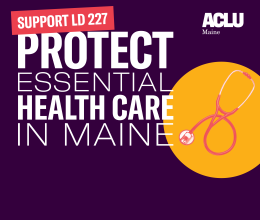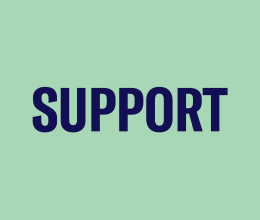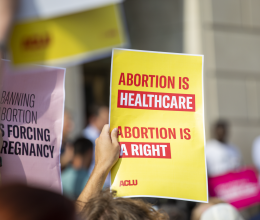In the past week, anti-abortion laws in both Texas and Louisiana have gained ground. After the passage and implementation of HB 2, Texas became one of the most anti-abortion states in the nation. A provision of HB 2 - one involving doctors' hospital admitting privileges - was struck down this past November by US District Judge Lee Yeakel, who determined that the requirement placed an unconstitutional burden on women seeking abortions. Last Thursday, the US Court of Appeals in New Orleans reversed Yeakel's decision, upholding the burdensome regulations. In Louisiana, the House passed HB 388, yet another bill imposing strict regulations on physician admitting privileges. Targeted Regulation of Abortion Providers bills of this type have been closing clinics all across the country, all under the guise of "women's safety."
Targeted Regulation of Abortion Providers (TRAP) laws are burdensome and unnecessary laws that impose regulations on doctors and practices that provide abortions. The regulations laid out in TRAP laws are always more onerous than the regulations imposed on other medical practices. Anti-abortion lawmakers and advocates regularly argue that TRAP laws are “pro-woman,” in that they purport protect the health and lives of women who make the decision to have an abortion. Louisiana’s Rep. Katrina Jackson, the sponsor of HB 388, tried to tell us that the bill was “about the safety of women” and that the bill would ensure that women seeking abortions would be “entitled to the protection of regulated safety standards.” The major flaw in this argument is that abortion procedures are safe – they’ve been safe since they were legalized in 1973. In fact, a first-trimester abortion is one of the safest medical procedures – less than .05% present major complications that might need hospital care. The risk of abortion-related death is also low, but increases with the length of pregnancy: one death for every one million abortions at or before eight weeks; one per every 29,000 at 16-20 weeks; one per 11,000 at 21 weeks or later. Both Louisiana and Texas have 20 week bans on abortions.
TRAP laws fall into three different categories: health facility licensing, ambulatory surgical center requirements, and hospitalization requirements. Health facility licensing laws generally require that abortion facilities become licensed by the state and meet a host of regulations related to facility construction, staffing, and procedures. Ambulatory surgical center (ACS) requirements force abortion providers (medical and surgical) be licensed as ACSs. ACSs are typically facilities that perform a range of out-patient surgeries. Hospitalization requirements mandate that second trimester and beyond abortions be performed at a hospital. All of these regulations are unique in that they aren’t required for other similar medical procedures or (in the case of the facility licensing laws) medical offices and clinics. These requirements go beyond what national health organizations require for abortion procedures.
TRAP laws have been difficult to defeat and, as a result, clinics are closing. The laws may pass overnight, but meeting the regulation requirements require time and money. Some licensing laws require that doctors performing abortion procedures must affiliate with a local hospital (within 30 miles). This is not a simple process. Gaining admitting privileges can take time; hospitals can decline to provide doctors with admitting privileges; physicians who travel between clinics would have to apply for admitting privileges at several different hospitals. Transforming a clinic into an ACS can cost a significant amount of money. Many clinics vulnerable to closure are located in economically depressed areas – the clinics simply don’t have the money to make these unnecessary changes. In Texas, TRAP laws have closed 20 clinics since 2011. When the most recent set of laws are fully implemented in September, it is expected that the number of clinics are going to drop into the single digits.
Despite the difficulties, these TRAP laws continue to be challenged. One state, Alabama, is the latest state to have its newly implemented TRAP laws challenged. This Monday, a federal judge ordered a trail to determine whether or not a new law requiring hospital admitting privileges poses an unnecessary burden for women seeking abortions. US District Judge Myron Thompson argued that the law could be a violation of women’s constitutional rights, particularly if the motivation for passing the bill was either the protection of fetal life or the closure of abortion clinics. If the statute is upheld, three abortion providers could face closure, leaving only two clinics open to serve all of Alabama’s women.






